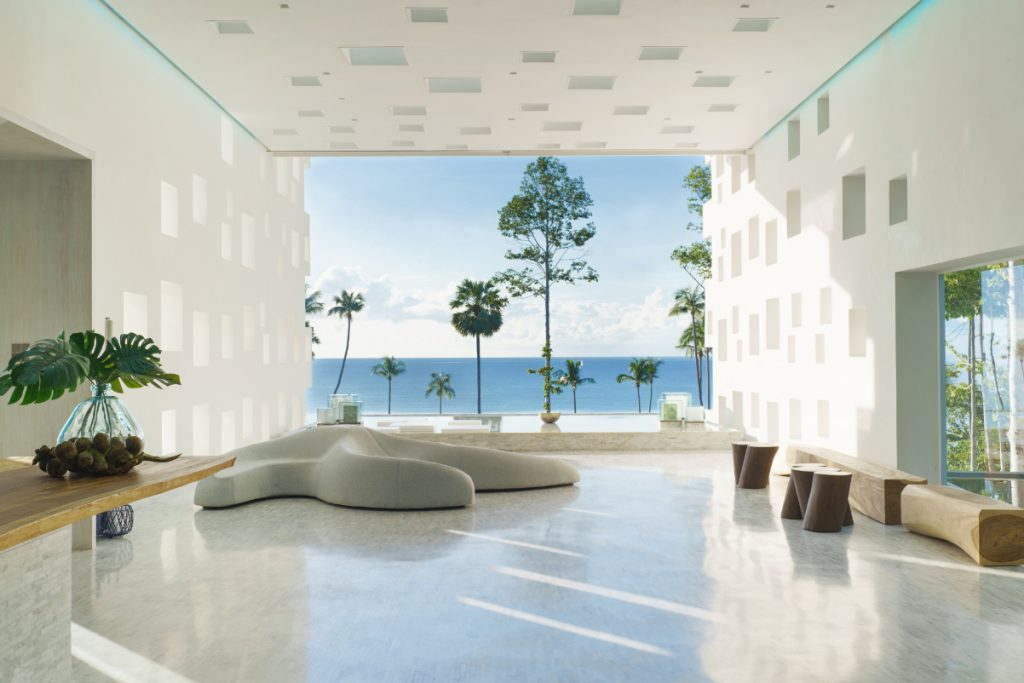Summarize this content to 2000 words in 6 paragraphs
Skift Take
Hyatt claimed success in capitalizing on a business travel recovery. But as it considers acquisitions and development deals, it must balance ambition with potential economic headwinds.
Sean O’Neill
Hyatt enjoyed a continued recovery in travel demand in the second quarter but did lower its full-year guidance for room revenue on Tuesday ahead of a possible softening to come.
“What we’re seeing is a sort of evening out of demand over time,” said Hyatt president and CEO Mark Hoplamazian on an earnings call.
“Overall, I would say that the general level of demand has been maintained at a very high level — significantly above the levels that we experienced in pre-pandemic times,” Hoplamazian said.
Hyatt’s global revenue per available room rose 4.7% year-over-year. European hotels jumped 11.8% as many well-off Americans visited Britain and continental Europe.
“Our business transient customer segment had the largest growth rate [among segments] during the quarter, with revenue up approximately 14%,” Hoplamazian said.
Room revenue from group bookings increased by about 8%. Looking ahead, Hyatt saw group bookings up 7% for the second half of 2024 and 7.5% for 2025.
Yes, But
Hyatt lowered its full-year guidance for revenue per available room growth between 3% and 4%, a tighter range than the previous 3% to 5%.
Executives explained the modest pullback in the outlook by mentioning a potential hurricane impact, China’s domestic weakness, and the Crowdstrike disruption on airline systems — which had a side effect of hurting hotel bookings in July.
“The high end of Hyatt’s RevPAR [revenue per available room] range coming down 100 basis points is similar to what Marriott did last week,” noted Truist Securities analysts in a flash report.
U.S. domestic leisure travel may be normalizing to pre-pandemic trends.
“Our outlook is informed by what we think is going to be a somewhat tougher third quarter but a more robust fourth quarter,” Hoplamazian said.
Wealth Gap
Hyatt did report signs of what Skift has called a “wealth gap” in travel demand.
“Although domestic travel declined, we’re seeing demand for travel from affluent customers increase,” noted Joan Bottarini, chief financial officer. “However, they are prioritizing international travel.”
However, all vacation spending worldwide has been steady. Leisure revenue per available room dipped 2% in the second quarter because Easter was earlier than a year ago and two key resorts underwent full renovations, executives said.
No Hints of Possible Acquisitions
In late July, Hyatt was reportedly nearing closing a transaction with Standard International, owner of the luxury lifestyle brand The Standard and other brands. However, the company didn’t comment on the reports or hint at any likely merger or acquisition activity.
“We have deals sort of in the hopper at this point,” Hoplamazian said. “We’ve been working on several that we feel really good about.”
“We have been and will continue to be very intentional with our organic and inorganic growth,” Hoplamazian said.
“Since the first quarter of this year, I’ve been talking about the fact that we see a robust opportunity and real opportunities, not just theoretical, to do portfolio deals,” Hoplamazian said.
“Sometimes that means doing a strategic partnership like portfolio deal like the Lindner Hotels deal, where we signed franchise agreements,” the CEO said. “Sometimes they come in the form of an acquisition of a brand or a management platform like we did with Dream Hotels, just as one example.”
Hyatt’s Second Quarter
Net income was $359 million, down from a year earlier.
Adjusted EBITDA was $307 million, up 10%.
The hotel group expanded the net number of rooms it manages by 4.6%.
Hyatt’s pipeline of property contracts expanded to a record 130,000 rooms, marking a 9% rise year over year.
Hyatt boosted the number of members in its loyalty program by 21% year-over-year, to 48 million.
Hyatt expects to complete its $2 billion asset disposition program by the end of August, further shifting towards an asset-light model.
Update on Latest Brand Additions
In late July, Hyatt added Under Canvas‘ luxury outdoor camps to its loyalty program, betting well-heeled travelers crave nature with creature comforts.
The move gave Hyatt a toehold in 13 wilderness locations near U.S. national parks. Members can now earn and redeem points on stays.
Since the partnership went live two weeks ago, about 60% of total bookings at Under Canvas locations were paid reservations and the rest were loyalty redemptions.
“A few months ago, I visited the Under Canvas Ulum resort in Moab, and I also loved my overnight stay at the Under Canvas North Yellowstone, Paradise Valley, in Montana,” Hoplamazian said.
Accommodations Sector Stock Index Performance Year-to-Date
What am I looking at? The performance of hotels and short-term rental sector stocks within the ST200. The index includes companies publicly traded across global markets, including international and regional hotel brands, hotel REITs, hotel management companies, alternative accommodations, and timeshares.
The Skift Travel 200 (ST200) combines the financial performance of nearly 200 travel companies worth more than a trillion dollars into a single number. See more hotels and short-term rental financial sector performance.
Read the full methodology behind the Skift Travel 200.


